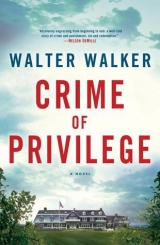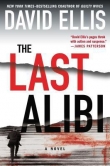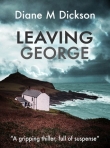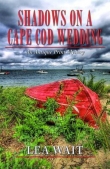
Текст книги "Crime of Privilege"
Автор книги: Walter Walker
Соавторы: Walter Walker
Жанры:
Триллеры
,сообщить о нарушении
Текущая страница: 9 (всего у книги 28 страниц)
12
.
THE FIRST PHONE CALL WAS FROM BARBARA. SHE WAS SO SORRY.
Her fourteen-year-old daughter had had a meltdown. “You know what it’s like with fourteen-year-old girls,” she assured me. “Everything is a life-ending crisis.”
I pretended I did.
“Anyhow, by the time I got back outside you were gone and nobody knew what had happened to you.”
Nobody, meaning Pop-pop, Malcolm, and Mr. and Mrs. Gatsby.
“I hope you’ll forgive me, hope you’ll let me make it up to you.”
Oh, sure. Yes. No problem. Don’t give it a second thought.
THE SECOND CALL came from Chuck Larson. He wanted to know if I had had a good time at the party.
How, exactly, did you know I was there, Chuck?
Did Jamie tell him? Did Jamie recognize me? Chuck wasn’t saying. His job was only to tell me things he wanted to tell me. He did, however, tell me what Jamie was doing there. He was thinking of producing a movie for Darra.
“I thought he was a Wall Street banker.”
“Banker? Sort of. Right now, Jamie’s making a lot of money for a lot of people in nontraditional investments.”
“What’s that mean?”
“Something to do with mortgages. Sub-prime mortgages. Don’t ask me, but folks at that party all want to invest with him. So now he’s thinking of branching out.”
“Into the movies.”
“People say he has the magic touch.”
I recoiled at the image.
“In any event,” he said, “Jamie was more or less showing off the product.”
That got him several seconds of dead air while I tried to figure out why he was telling me this.
Chuck Larson sighed. “You still looking for Paul McFetridge?”
“I am.”
“Try Stanley, Idaho, Georgie,” he said. “Two Rivers Whitewater Rafting Company.”
I wondered if I had passed some sort of test. You saw Jamie and you behaved yourself. Here’s your reward, good boy.
1
.
SALMON RIVER, IDAHO, June 2008
IT WAS A SMALL PLANE, A TAIL-DRAGGER WITH NO WHEEL IN THE front. It held the pilot and would have held five passengers if one of the seats was not filled with gear. We landed on a dirt runway that required a very sharp left bank in which the pilot seemed to exult. I had the feeling the whole flight up from Boise to this pinprick on the map known as Indian Creek had been worth it to the pilot just so he could make that bank.
The first three passengers who disembarked were greeted with a smile and a welcoming handshake. I got an “Oh, shit.”
It did not come right away. Initially I got a smile, then the smile faded, replaced by a look of confusion, then recognition. Then, “Oh, shit.”
We shook hands nonetheless. I wondered if he would hug me, as I think we had done when we last saw each other. But Paul McFetridge was raised an Episcopalian. In my experience they don’t like to touch, preferring to sing boldly instead.
“Paul.”
“Jesus.”
“Not quite.”
“The hell you doing here?” He was still holding on to my hand.
“Came to go rafting.”
“So is this, like, a coincidence?”
Paul McFetridge’s hair was very long and pulled back into a ponytail. Curly and springy hair does not fit well in a ponytail, and his was no exception. He could have been carrying a pillow on the back of his head. His features had grown lean and hawkish over the years and he had developed something of a stoop, so that his neck seemed to project forward and his shoulders curled slightly inward. His was no longer the look of a college tennis player with a hundred-twenty-mile-per-hour serve.
“I called your mother.”
“She knew where I was?”
“She said you were a”—I did my best to imitate her voice—“ ‘river … guide.’ ”
He let go then. He searched my eyes.
“I got divorced recently,” I said. “I’m on my own. So when she said that, I thought, ‘What the hell, I’d like to go whitewater rafting,’ and I figured if I was going to do it, especially by myself, I’d try to do it where you were. At least I’d know somebody.”
I had practiced all of this. I thought it went off well. But McFetridge kept waiting for more. And then, finally, he asked, “Where you living?”
I told him I was a lawyer on Cape Cod, and he thought about that before clapping me on the back and telling me we’d better get my gear down to the river and meet the others. This was not his company. But he was the senior guide on this trip. The one who knew the river best. It was up to him to get things going, keep folks organized. Don’t worry, though. We’d have plenty of chances to talk. Catch up. Remember old times.
WE WERE SUPPOSED TO have put in twenty-five miles upstream and done a series of class IV rapids, but the snowfall the previous winter had been heavy and the roads that the outfitters needed to get in their equipment were still blocked and so we put in at Indian Creek and had a short and leisurely run on the first day. There were twenty of us paid participants and about seven crew members, two of whom floated down ahead of us each day to set up camp.
We were given a lecture before we started. The river, we were told, was exceptionally high and the water flowing exceptionally fast. There were few rocks sticking out and even fewer drops. The danger was getting caught in a hole, a depression formed by subsurface boulders, where the raft would tip on its side and stall, perhaps dumping paddlers out. If we got dumped, we were told, it was necessary to get out of the hole any way possible. Do not allow the swirling water to circulate you. If you are pulled down, form a ball and try to drop all the way to the bottom, then spring back up again at an angle. The guides will get you a rope as quickly as they can.
I got into a raft with five other folks and McFetridge sitting in the stern with a pair of oars. We paddled when he told us to paddle, stopped when he told us to stop. There was little to it on that first day, little danger, little required output by the paddlers, so little that I had the feeling he did not really need us to propel the boat as much as he wanted us to think we were.
McFetridge talked to everyone in the raft as we went forward, me no more than anyone else. I was confident he knew what he was doing. As a student and an athlete he had always known what he was doing, and he had never acted as though anything required particular effort or concern. Things would work out for McFetridge. They would work out for his friends … unless he and his friends wanted the same thing, in which case his friends’ interest was of no consequence. I pictured myself going over. I pictured myself going into one of those holes. I pictured McFetridge continuing to guide the boat right on down the river.
WE CAMPED FOR the night at a place called Marble Ledge along the left side of the river. I was given my own tent, for which I was grateful. First day on the voyage and most people clung to whomever they came with, which left me on my own. I climbed a very steep hillside that was covered with thousands and thousands of yellow flowers known as arrowleaf balsamroot. I got about halfway up the slope, sat down on a rock that gave me a good view of the river, and wondered what I was doing there.
2
.
ONCE, SHORTLY AFTER MARION AND I GOT MARRIED, WE WENT to a party at Mitch White’s house. It was the only time I was ever there. He lived in the town of Dennis and it was a perfectly nice home, the kind you might see in suburban Boston, with a two-car garage and a manicured lawn. It was not the type of house that could be found on the Cape prior to the latter part of the twentieth century, but Mitch and his wife did not know that.
Mrs. White’s name was Stephanie, a sharp-featured woman who wore pointy eyeglasses and was possibly hiding an impressive figure under a consistently dowdy wardrobe. Like her husband, she was mid-forties and seemed slightly bewildered by the rush of time. She knew things were supposed to be done a certain way and that was the way she did them. Utensils were wrapped in napkins and set out next to a stack of small plates at the end of the dining room table, which was covered with a tablecloth that sported images of lobsters and clams. The real things were not among the array of hors d’oeuvres that were carefully arranged on the table, but the tablecloth images paid homage to their place of origin.
Stephanie, despite her seeming lack of savoir faire, scared a lot of people. She had an edge to her, and while she did not say much, she tended to stare at other people rather intensely, as though she was waiting for some criticism that she knew was probably justified and for which she was already planning a response.
She and Mitch had a son, a broad-shouldered twelve-year-old with a toothy smile. One could only assume that Stephanie had large brothers, because the boy had a lot bigger frame than either of his parents. They dressed him up in a tie and one of Mitch’s short-sleeved white shirts and had him serve nonalcoholic drinks on a tray. There were local wines, one red and one white, but they were on a card table in the backyard and partygoers had to go find those themselves and then pour them into plastic cups.
It was Marion’s first introduction to the attorneys in my office and when they discovered where she worked she became the most popular person at the party. Later, she would tell me she couldn’t understand why I didn’t have more friends among my co-workers. Such fun people, she said, so convivial.
Shortly after 9:00, when Marion had drunk most of what was available to drink and pried herself away from those desperately craving a Boston job with a prestigious law firm, she sidled up to me and asked me to come with her. I had been thinking it was time to leave, but she wanted me to accompany her to the second floor. People had been going up and down the staircase all evening because there was only one bathroom on the first floor and I figured she wanted me to guard the door so she could use the facility upstairs. I didn’t think that was necessary, but I had nothing else to do, so I went.
Once on the second floor, however, Marion wanted me to go into the bathroom with her. She looked up and down the hallway, determined no one was watching, and pulled me by the wrist. “Here,” she said, locking the door behind us. The same look was in her eye that she had shown after she had fooled the cops in Old Town.
“What?” I said, hoping she didn’t really mean it.
She turned, positioned herself over the sink and in front of the mirror. She did not touch the faucets, she just pointed her hands outward, placing one on each side of the sink, and grinned mischievously into the reflecting glass.
When I did not react, she leaned farther forward, moved both hands to her hips, and slowly raised her skirt all the way up until it exposed her ass. She was wearing a satin thong. A skimpy, cherry-colored thong. Her mouth opened, her teeth flashed in the glass. “You like?”
“Marion, we can’t do that in here.” But I was staring at the thong, the way it disappeared between the rounded mounds of flesh.
“Fucking in your boss’s house,” she whispered hoarsely, looking over her shoulder. “What could be better?”
“Put your skirt down, Marion.” But I was still looking at her ass, still imagining where that tiny piece of cloth was going.
“Come on, Georgie—it will be fun.” She leaned even farther forward. She began to grind her hips one way and then another.
“Jesus, Marion,” I said, my heart beating, sweat forming on my lip. “Get dressed. I’ve got to work with these people.” I put my hand on the door handle, looked into the mirror, and saw the disappointment on her face.
It was, I recalled as I sat on the hillside above the Middle Fork of the Salmon River, the beginning of the end for my wife and me.
3
.
I EXPECTED WE WOULD TALK THAT FIRST NIGHT ON THE RIVER, but a makeshift bar had been set up and the booze kept flowing after dinner and everyone, clients and crew alike, sat around the campfire as a group, telling stories and staring into the flames. McFetridge was as friendly to me as he was to everyone else, but he stayed on the other side of the fire. A woman crew member named Bonnie sat next to him. They didn’t talk, didn’t touch, but I sensed an air of possession on her part in the way she positioned herself, the way she looked at him.
Bonnie was five-feet-ten and sturdily built, with long, dark hair and a muscular stomach, which she made constantly visible: a bikini top in the morning, a cutoff T-shirt in the evening. In the outside world she might have been a landscaper, a physical education teacher, a UPS driver. Here, there was no doubt she was the belle of the river.
THE NEXT DAY I was told I was in Bonnie’s boat. There was a rough stretch of rapids, McFetridge said, and she was going to need some strong paddlers. As before, the water was running swiftly, and in the morning I was never sure if she really needed me or not. But I sat in the key paddling seat, right front, and when she told me to go forward, I went forward; when she told me to backpaddle, I backpaddled; and when she told me to dig, I dug, setting the pace for the five other paying guests.
We broke for lunch and had elaborate sandwiches that we put together from an extensive smorgasbord of meats and cheeses and condiments, chased down by cans of beer, and then in the afternoon we hit the rapids. There was an oar boat ahead of us being manned by one of the paid crew, then our boat went next. We watched the oar boat bounce around and oohed and ahhed as it readied itself. Bonnie said to go forward, and suddenly we were skimming downstream twice as fast as we ever had before.
Bonnie shouted to paddle hard and we did, or at least I did, as a four-foot wave smacked the front of the boat and washed over us. She screamed, “Left back!” and the three of us on my side stroked forward while those on the left were supposed to backpaddle. Something went wrong. We turned too sharply and took a wave broadside. “Right back!” she screamed, and I planted the oar on my hip and pulled backward with all my might. The bow swung and all of a sudden the other side went vertical and one of the paddlers went flying over the gunwale as the raft shuddered to a halt, caught on a huge sloping rock just beneath the surface. “High side!” Bonnie yelled, as water poured in on us and the two of us remaining on the right abandoned any effort to do anything other than scramble up to where the others were. The raft shifted, the stern went clockwise, and we shot off backward, dropping almost straight down, Bonnie frantically pulling at the oars, her head turned about one hundred eighty degrees over her shoulder, searching for her lost rafter, her voice beseeching everyone to get back to their stations.
We hit something hard and it jarred all five paddlers into the middle of the boat as another huge wave hit us like a car crash. I crawled back to my position in the front and tried to paddle, tried to get a rhythm, but I seemed to be the only one doing it. Wave after wave rolled into and under us and in between swells my paddle was grabbing nothing but air. We were up for an instant and then plummeted down into a depression as suddenly as if we were on a roller coaster and once again the left side caught and snapped straight upright. There was a cry behind me and first one paddler and then another flew out of the boat. “Grab them,” yelled Bonnie, but they were gone. It was all I could do to hold on myself as someone from the left side smacked into me and went overboard. There was a scream of panic and a fifth rafter went out as the boat continued to wobble on its side. It was a man, the only other good paddler, the one who had been in the left front. I reached for his life vest, but the water wrenched it out of my fingers the moment I touched it. I threw my head back and looked for Bonnie to tell me what to do. It was just her and me. She was still holding on to the oars, even though only one of them was in the water, and she was looking directly at me without the slightest indication she knew what came next.
4
.
IN MIDAFTERNOON WE FLOATED INTO CAMP NEAR LOON CREEK. The five people who had gone swimming weren’t sure they wanted to go on. McFetridge had his hands full, trying to convince them how difficult it would be to get them off the river.
I watched from afar, impressed with the way McFetridge was handling the situation, not denigrating the guests’ fears but trying to assuage them, make them seem unreasonable without being unfounded. It must have been hard for him; McFetridge had never been a sensitive guy.
The rafters who had not done the inadvertent swim had set off on a two-and-a-half-mile hike to some hot springs. McFetridge, when he was done wheedling, cajoling, promising, looked up and saw I was there, waiting for him. After a while, he made it over to me, shaking his head, speaking quietly. “I guess now you see why I wanted you in Bonnie’s boat.”
“Because you wanted to see me drown?”
McFetridge had not expected such words to come out of my mouth. “Bonnie’s a damn good rafter,” he said. “Things just got away from her on that one. It happens.”
“She been guiding long?”
He looked as though he was thinking of lying and then changed his mind. “It’s her first time. Although I’d rather the others not know that.”
“She your girlfriend?”
McFetridge hesitated. “I guess. Things are kind of different out here.” He glanced back at the distraught rafters, his excuse for getting away. They were sitting up now, speaking quietly to one another. The man who had been positioned across from me and his wife were leaning forehead to forehead, and every now and then the two of them glanced up. From what I could tell, they were glancing at me. As if I were somehow to blame because they went out of the boat. As if I were at fault for not going out.
The husband seemed to be doing his best to convince his wife of something and she was resisting. In my married experience, it was usually the other way around. But I recognized the dynamics.
“We really should talk, Paul,” I said.
He sighed and cast one more longing look back at the unhappy guests. “If we’re gonna do that,” he said, “I’d rather not do it around camp. Most of the people will be coming back from the hot springs in a little while so they can get ready for dinner. So here’s what I’m thinking. I’ve got to finish up with these folks, take care of them, convince them everything is going to be okay. You head on up there now and I’ll join you as soon as I can. I’ll get the kitchen crew to set aside a couple of plates for us. Okay?”
Can’t talk here. Go 2.5 miles into the wilderness and wait for me there. Got it, George? Sure, Paul, no problem. I just walk straight until night and then turn left, is that it?
TO GET TO the hot spring, I walked along the Salmon on a narrow dirt path that bore the footprints of my colleagues and went up and down little rises and around bends that opened into groves of Douglas firs and lodgepole pines. Most of the way I was accompanied by a pair of yellow-and-red-and-black western tanagers, who constantly zoomed ahead of me and then dashed back as if they were border collies out for a walk. Then I went up a somewhat sharper incline and found myself in a big meadow filled with blue spruce–like bushes that stood about five feet high and were spaced far enough apart to make me feel I was at a Christmas tree farm. And it was then that I first heard the Loon, sounding vaguely like a great wind or crowd noise emanating from a giant stadium, growing louder with each step I took.
The trail bent to the right as I left the Salmon and headed along the tributary and the noise took on a crushing tone as if it were a waterfall. I would have had to raise my voice to be heard, if anybody had been around to hear.
There was a footbridge leading to what looked like a small ranch, which I figured must be some sort of fishermen’s retreat. It had a windsock, indicating an airstrip, but I saw no indication of aircraft. As I passed the bridge my fellow rafters were coming back in the other direction. “Hey, George, you just getting here?” called one. “It’s still a quarter-mile,” shouted another, cupping his mouth. “You’re going to miss cocktails!” cried a third.
I counted them: thirteen. I made fourteen. There were at least four who stayed in camp. Who else was there?
After what seemed to be considerably more than the allotted mileage I had been given, I encountered two more rafters coming up from a steep path that dropped down to the creek. “Right down there, George. You’ll love it.”
At the creek’s edge, someone had built a stone box at least twenty feet long and six feet wide. A pipe projected from the hillside, and a constant stream of hot water flowed into one end of the rectangle. It was a lovely setting, with Loon Creek swirling by, and I had it all to myself.
I wondered if I should get in naked. It was just me and the great outdoors. But of course McFetridge would be along soon and it would be weird, me waiting for him like that, so I kept on my bathing suit. I sat in the hot water and I waited.








